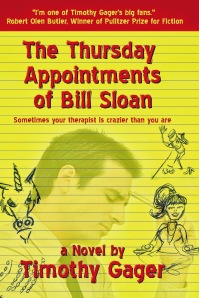No matter how long someone has been writing and publishing (traditional or self), there’s always something to learn. And there’s usually, at one time or another, a desire to hear from someone who’s gone through, or is going through, something similar. I thought it would be fun to have a series of Q&As with writers and others in the writing & publishing field that both educates and commiserates.
The first interview subject is author Timothy Gager, who answers five questions about writing and five questions about publishing. (I’d like to thank the readers and writers on the Kindle Boards for submitting questions, a few of which were used here and more of which I plan to use or draw from in future Q&As.)
.
5 ON WRITING
Q: What piece of writing advice does it make you twitch to see experienced writers giving new writers?
TIMOTHY GAGER: I think most advice, even cliché advice, is true to some extent. That being said, I tend to twitch when the advice is, “You MUST do it a certain way,” usually THEIR WAY, because each writer learns things differently. Some writers are visual, some are more factual — different advice works differently for different people.
What piece of advice has been most valuable to you as a writer?
There have been two. The first was to write all the bad things out. This helped when I was first starting and there was a lot of bad to write out — the canned plots, metaphors and phrases – I had to write and read a lot to learn what I shouldn’t do. The second was when I was writing my novel, and it was to never write till you are completely dry, no matter how productive you think that might be.
What is the difference between what you thought the writing life would be vs. what it actually is?
This may not even be a reflection of my writing or my life, because I had no illusions about becoming rich and famous through writing. What I do see is writers struggling more than I ever thought. Those with degrees in Adjunct Positions, those without freelance opportunities. There’s a whole lot of artists who are willing to work for little or nothing and it affects every writer out there.
 Between the first draft of The Thursday Appointments of Bill Sloan and its submission to your agent or publisher, how many revisions would you say the book went through, and how many people read it to offer constructive feedback and aid in the revision process?
Between the first draft of The Thursday Appointments of Bill Sloan and its submission to your agent or publisher, how many revisions would you say the book went through, and how many people read it to offer constructive feedback and aid in the revision process?
If this includes rejections from agents and publishers, it went through 10-20 minor revisions and one major, where I eliminated one character and about 20,000 words. That, though, didn’t happen until after the current publisher, Book Table, took it. The number of people who read it, to give feedback, I can’t even count. I received some very good feedback from Jay Mandell, the late Ned Vizzini’s agent from William Morris Entertainment. His advice was spot on, even though he didn’t have to do anything for me.
You’ve been writing and publishing for a while. Do you still get nervous about releasing your writing to people who might hate it, who might criticize the writing? Not the characters or the story, but the writing.
More self-hate than nervousness, if that makes sense, and only after they hate or criticize it. I’m pretty confident my work is strong, until I get in my own head.
.
5 ON PUBLISHING
.
How much input do you think an author should have on cover art?
I’ve had input on each and every cover concept, some more than others. I’ve asked artist friends of mine, Annie Libertini and Teisha Dawn Twomey, to provide the art work for covers. I think I have a pretty good eye for design, but I’m not recommending it for everyone. The bottom line is that some things you have to let go of. If the publisher wants it to look a certain way, they are the publisher, for Christ sake — they have and should have the final say.
I asked writers on the Kindle Boards for questions they like seeing in interviews with authors. One that came up more than once is what kind of software you use to write. Word, Scrivener, other?
Word, word and only word. I’ve no experience in anything else. Leave it to a Kindle Board to come up with geek speak.
What are your feelings about self-publishing?
It’s not for me. I think there is a lot of self-published work that has serious needs that a publisher would have taken care of, just because they are an outside eye and voice. As a reader, I never know what I’m going to get. As you know, there are wonderful books that are self-published and some not so good. As a writer, besides trying to sell my book, I’d end up needing to sell the idea of a self-published book to a reader. Ugh. One extra hurdle when I’m wearing my promotional hat.
What marketing tactic did you think would be a sure thing that ended up being embarrassingly ineffective?
I’ve never been embarrassed by a marketing tactic, even if it’s failed. I tend to not give up and if something is not working well, I’ll try something else. The key is to try new things, not the same old things that every single writer is trying. For example, you can still go to writer’s conferences where they tell you to “Open a Facebook account—or use Twitter.” Duh. My March Madness Book giveaway garnered a lot of attention at the cost of one book and a couple of filmed dice games, horse races, coin flips and open faced poker games.
What’s your opinion on book review sites that charge a fee? (This includes Kirkus.)
Isn’t that like paying to publish? Even if the reviews are objective, I have my doubts. It’s your basic conflict of interest on the Kirkus end. Also, it’s a manipulative trick which tricks a buyer who has no idea that the author or publisher paid for a review.
Thank you, Tim.
 Timothy Gager is the author of eleven books of short fiction and poetry. His latest, The Thursday Appointments of Bill Sloan (Big Table Publishing), is his first novel. He has hosted the successful Dire Literary Series in Cambridge, Massachusetts for over thirteen years and is the co-founder of Somerville News Writers Festival. His work appears in over 300 journals, of which nine have been nominated for the Pushcart Prize. His work has been read on National Public Radio.
Timothy Gager is the author of eleven books of short fiction and poetry. His latest, The Thursday Appointments of Bill Sloan (Big Table Publishing), is his first novel. He has hosted the successful Dire Literary Series in Cambridge, Massachusetts for over thirteen years and is the co-founder of Somerville News Writers Festival. His work appears in over 300 journals, of which nine have been nominated for the Pushcart Prize. His work has been read on National Public Radio.

Kristen Tsetsi is the author of the post-Roe v. Wade novel The Age of the Child, called “scathing social commentary” and “a novel for right now.” She is also the author of the novels The Year of Dan Palace and Pretty Much True (studied in Dr. Owen W. Gilman, Jr.’s The Hell of War Comes Home: Imaginative Texts from the Conflicts in Afghanistan and Iraq). Kristen’s interview series at JaneFriedman.com offers behind-the-scenes insights into all things writing and publishing.



Reblogged this on Writer's Work Lab.